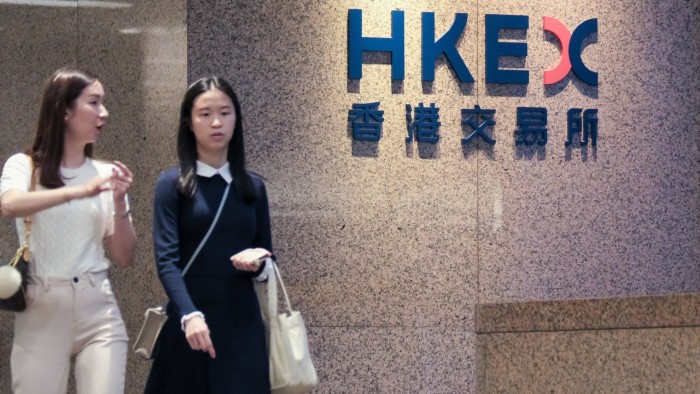Hong Kong’s blank-cheque companies are landing their first acquisition targets but corporate executives warn that tight rules are stifling the risk-taking they are meant to reward.
Last month heralded the first Hong Kong special purpose acquisition vehicle to close a deal, merging with Synagistics, a Singaporean ecommerce company.
The acquisition by the blank-cheque company, headed up by Norman Chan, former head of the Hong Kong Monetary Authority, is likely to be followed by two other mergers that are awaiting final approval from regulators.
Hong Kong authorities regard Spacs, permitted for the first time in 2022, as a way to reanimate their domestic equity market and attract more international companies to list in the territory.
Spacs typically look to raise funds through listing on a stock market, and then aim to purchase a private company, pulling its target on to public markets — a so-called de-spac transaction.
But executives who have been through the process are warning that trickle is unlikely to become a flood.
“Arguably, it’s actually more complicated in terms of process than to go through a listing,” said Katherine Tsang, who was an executive director of the investment vehicle behind the Synagistics deal alongside Chan. She is also a former chair of Standard Chartered in Greater China.
After conducting merger talks with a promising private company, “they still need it to go through the entire IPO vetting process”, she added.
The experience underscores the delicate balance for Hong Kong as it tries to maintain its attractiveness as an international listings hub while its market moves closer to mainland China.
KPMG estimates the territory is the fourth-largest market for new listings by market value this year, but the numbers were boosted by just one company — the $4bn listing of Midea, a Chinese electronics manufacturer.
China’s sluggish rebound from the coronavirus pandemic has also damped stock market valuations. Hong Kong’s equity market has received a much-needed boost from Beijing’s policy stimulus launched in September, with the Hang Seng index notching its best week since 1998 upon the news of the policy blitz.
But the market has since come down as investors express disappointment in the mainland fiscal stimulus so far and hedge the potential damage of a second Donald Trump presidency in the US.
Authorities sought to emulate the Spac boom in the US in 2021, which raised some $163bn for companies to hunt for deal targets, according to data from Dealogic. The new rules were intended as another route for dealmaking in Asia.
“The beauty of a Spac is that the funds are ready, and for companies looking to list on the Hong Kong exchange I think it will be an attractive alternative to the listing path,” said Jean Thio, capital markets partner at law firm Clifford Chance.
She pointed out that private companies could establish their valuations through direct negotiation with an acquirer, rather than rely on the market price.
“There might be special interest for specialist tech companies as well as companies without market peers listed on the HK exchange,” she said.
However, Hong Kong also sought to guard against low standards: the US boom was widely seen as leading to a bubble — with one short seller dubbing them “castles in the sky”. Critics of the boom in the US say it enriched Spac founders and advisers while often punishing investors, especially retail money.
“I didn’t feel entirely comfortable with it [in the US] . . . the promoters were some strange characters, baseball stars, with no actual finance experience acting as promoters,” said Chan.
The regulations stipulate that Hong Kong Spacs have to meet all the same requirements as an initial public offering. Moreover, unlike in the US, investing in Spacs is only open to professional investors rather than being a retail money play.
Only five Spacs have raised money in Hong Kong since the new rules were introduced nearly three years ago, according to Dealogic.
Optimists say Spacs can find their utility by helping more niche, or foreign, companies list on the Hong Kong exchange.
Chan said his company’s “network”, which includes the main investors in the Spac, would help the Singaporean data company attract vendors in Greater China who are targeting the large south-east Asian market.
But as Hong Kong moves closer to mainland China economically, market participants fear the territory’s capital markets are still overly reliant on Chinese companies looking for an offshore secondary listing.
“The traditional [Chinese] A-share companies doing secondary listings would not be able to do a de-spac,” added Thio.
“In fact, any kind of Chinese companies would be subject to CSRC [mainland Chinese regulator] rules and regulatory approvals. It’s something that puts the timeline into uncertainty.”
One adviser who works on Spac transactions in Hong Kong said they were doubtful the new listing avenue would lead to any meaningful amount of new companies listing in the territory.
“Hong Kong has always said they don’t like backdoor listings. But [de-]spacs are by definition backdoor listings,” said the adviser, who did not have authorisation to speak publicly.
“It’s no different to applying for a new initial public offering — you need all the vetting. If you look around, the global trend is that Spacs have not done well. I don’t think they will get bigger in the future.”
Synagistics’s share price has underlined the growing caution. After listing it leapt as much as 400 per cent from its debut price of HK$10 ($1.29) per share. On Wednesday it closed down at HK$12.50.
Read the full article here

